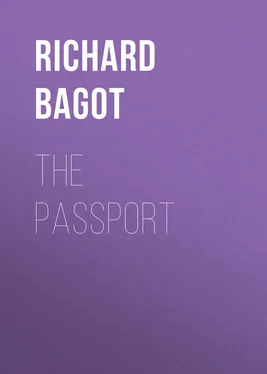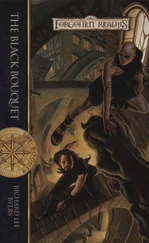Richard Bagot - The Passport
Здесь есть возможность читать онлайн «Richard Bagot - The Passport» — ознакомительный отрывок электронной книги совершенно бесплатно, а после прочтения отрывка купить полную версию. В некоторых случаях можно слушать аудио, скачать через торрент в формате fb2 и присутствует краткое содержание. Жанр: foreign_antique, foreign_prose, на английском языке. Описание произведения, (предисловие) а так же отзывы посетителей доступны на портале библиотеки ЛибКат.
- Название:The Passport
- Автор:
- Жанр:
- Год:неизвестен
- ISBN:нет данных
- Рейтинг книги:4 / 5. Голосов: 1
-
Избранное:Добавить в избранное
- Отзывы:
-
Ваша оценка:
- 80
- 1
- 2
- 3
- 4
- 5
The Passport: краткое содержание, описание и аннотация
Предлагаем к чтению аннотацию, описание, краткое содержание или предисловие (зависит от того, что написал сам автор книги «The Passport»). Если вы не нашли необходимую информацию о книге — напишите в комментариях, мы постараемся отыскать её.
The Passport — читать онлайн ознакомительный отрывок
Ниже представлен текст книги, разбитый по страницам. Система сохранения места последней прочитанной страницы, позволяет с удобством читать онлайн бесплатно книгу «The Passport», без необходимости каждый раз заново искать на чём Вы остановились. Поставьте закладку, и сможете в любой момент перейти на страницу, на которой закончили чтение.
Интервал:
Закладка:
Giacinta glanced at her brother proudly.
"Yes," she said, "I believe you will – I am sure you will, if – " And then she hesitated.
"If what?" demanded Silvio.
"If you do not make an imbecile of yourself first," his sister replied, dryly.
Silvio Rossano flung the newspaper he had been reading on to the floor, and his eyes flashed with anger. In a moment, however, the anger passed, and he laughed.
"All men are imbeciles once in their lives," he said, "and most men are imbeciles much more frequently – "
"Oh, with these last it does not matter," observed Giacinta, sapiently; "they do themselves no harm. But you – you are not of that sort, Silvio mio . So before making an imbecile of yourself, it will be better to be sure that it is worth the trouble. Besides, the thing is ridiculous. People do not fall in love at first sight, except in novels – and if they do, they can easily fall out of it again."
"Not the other ones," said Silvio, briefly.
"The other ones? Ah, I understand," and Giacinta looked at him more gravely. She was very fond of this only brother of hers, and very proud of him – proud of his already promising career and of his frank, lovable disposition, as well as of his extreme good looks. In truth, when she compared Silvio with the large majority of young men of his age and standing, she had some reason for her pride. Unlike so many young Romans of the more leisured classes, Silvio Rossano had never been content to lead a useless and brainless existence. Being an only son, he had been exempt from military service; but, instead of lounging in the Corso in the afternoons and frequenting music-halls and other resorts of a more doubtful character at night, he had turned his attention at a comparatively early age to engineering. At the present moment, though barely five-and-twenty, he had just completed the erection of some important water-works at Bari, during the formation of which he had been specially chosen by one of the most eminent engineers in Italy to superintend the works during the great man's repeated absences elsewhere. Thanks to Silvio Rossano's untiring energy and technical skill, as well as to his popularity with his subordinates and workmen, serious difficulties had been overcome in an unusually short space of time, and a government contract, which at one moment looked as if about to be unfulfilled by the company with whom it had been placed, was completed within the period agreed upon. There could be little doubt that, after his last success, Silvio would be given some lucrative work to carry out, and, in the mean time, after an absence of nearly a year, he had come home for a few weeks' rest and holiday, to find his father and sister installed in Palazzo Acorari.
It was, perhaps, not to be wondered at if Giacinta Rossano felt uneasy in her mind on her brother's account. She knew his character as nobody else could know it, for he was barely two years younger than she, and they had grown up together. She knew that beneath his careless, good-natured manner there lay an inflexible will and indomitable energy, and that once these were fully aroused they would carry him far towards the end he might have in view.
The interest that Donna Bianca Acorari had aroused in Silvio had not escaped Giacinta's notice. She had observed where his gaze had wandered so frequently during the midnight mass a few nights previously, and, knowing that Silvio's life had been too busy a one to have left him much time to think about love, she had marvelled at the effect that Bianca Acorari seemed suddenly to have had upon him. Since that night, whenever they were alone together, he would begin to question her as to the surroundings of their neighbors on the floor below them, and urge her to make friends with Donna Bianca. It was in vain that Giacinta pointed out that she had only interchanged a word or two with the girl in her life, and that there was evidently a fixed determination on the princess's part not to permit any acquaintance.
This last argument, she soon discovered, was the very worst that she could use. Like most Romans of the bourgeoisie to which he by birth belonged – and, indeed, like Romans of every class outside the so-called nobility – Silvio was a republican at heart so far as social differences were concerned; nor – in view of the degeneracy of a class which has done all in its power in modern days to vulgarize itself in exchange for dollars, American or otherwise, and to lose any remnant of the traditions that, until a generation ago, gave the Roman noblesse a claim upon the respect of the classes nominally below it – could this attitude be blamed or wondered at.
At first, Giacinta had laughed at her brother for the way in which he had fallen a victim to the attractions of a young girl whom he had never seen before, but she had very soon begun to suspect that Silvio's infatuation was no mere passing whim. She was well aware, too, that passing whims were foreign to his nature. Since that Christmas night, he had been more silent and thoughtful than she had ever seen him, except, perhaps, in his student days, when he had been working more than usually hard before the examinations.
Of Bianca Acorari herself he spoke little, but Giacinta understood that the drift of his conversation generally flowed towards the family on the piano nobile and how its members occupied their day. Moreover, Silvio, she observed, was much more frequently in casa than was altogether natural for a young fellow supposed to be taking a holiday, and he appeared to be strangely neglectful of friends and acquaintances to whose houses he had formerly been ready to go. Another thing, too, struck Giacinta as unusual, and scarcely edifying. Silvio had never been remarkable for an alacrity to go to mass, and Giacinta knew that he shared the professor's views on certain subjects, and that he had little partiality for the clergy as a caste. Apparently, however, he had suddenly developed a devotion to some saint whose relic might or might not be in the church of Santa Maria in Piazza Campitelli, for Giacinta, to her surprise, had met him face to face one morning as she had gone to mass there, and on another occasion she had caught a glimpse of his figure disappearing behind a corner in the same church. It was only charitable, she thought, casually to inform this devout church-goer that the Princess Montefiano had a private chapel in her apartment, in which the Abbé Roux said mass every morning at half-past eight o'clock.
In the mean time, the professor, occupied with his scientific research, was in happy ignorance of the fact that disturbing elements were beginning to be at work within his small domestic circle, and Giacinta kept her own counsel. She hoped that Silvio would soon get some employment which would take him away from Rome, for she was very sure that nothing but mortification and unhappiness would ensue were he to make Bianca Acorari's acquaintance.
Some days had elapsed since Christmas, and Giacinta Rossano had not again seen either Bianca or the princess. Under the circumstances, she by no means regretted the fact, for she rather dreaded lest she and her brother might encounter them on the staircase, and then, if Silvio behaved as he had behaved in the Sudario, the princess would certainly suspect his admiration for her step-daughter.
In Rome, however, families can live under the same roof for weeks, or even months, without necessarily encountering each other, or knowing anything of each other's lives or movements; and it so happened that no opportunity was given to Giacinta, even had she desired it, again to interchange even a formal greeting with the girl who had evidently made such an impression at first sight on her brother.
Of late, too, Silvio's interest in their neighbors had apparently diminished, for he asked fewer questions concerning them, and occasionally, Giacinta thought, almost seemed as though desirous of avoiding the subject.
Читать дальшеИнтервал:
Закладка:
Похожие книги на «The Passport»
Представляем Вашему вниманию похожие книги на «The Passport» списком для выбора. Мы отобрали схожую по названию и смыслу литературу в надежде предоставить читателям больше вариантов отыскать новые, интересные, ещё непрочитанные произведения.
Обсуждение, отзывы о книге «The Passport» и просто собственные мнения читателей. Оставьте ваши комментарии, напишите, что Вы думаете о произведении, его смысле или главных героях. Укажите что конкретно понравилось, а что нет, и почему Вы так считаете.












